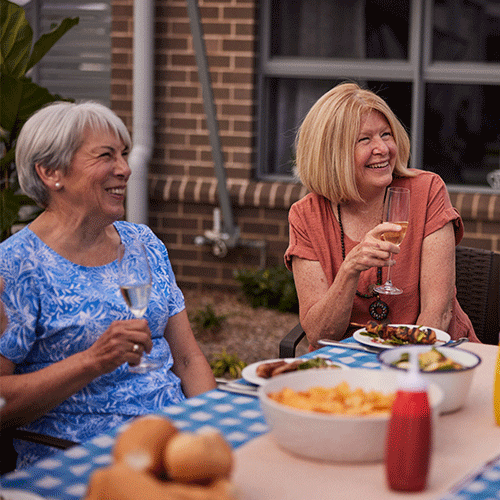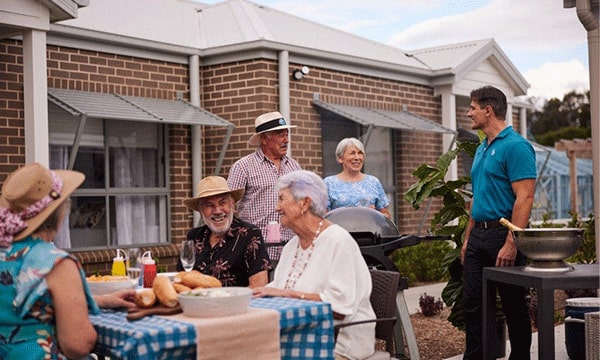What is positive ageing and 5 tips to achieve it
In this article we explore the concept of positive ageing, what it is, how it can benefit you and how to achieve it for yourself.

Many people may not know that we are now living in the ‘Decade of Healthy Ageing’, as declared by the United Nations General Assembly in 2020.
Healthy ageing, also known as positive ageing, can increase life expectancy and your overall wellbeing – but what does it actually mean?
What is positive ageing?
The Australian Psychological Society defines positive ageing as “the process of maintaining a positive attitude, feeling good about yourself, keeping fit and healthy, and engaging fully in life as you age”. Ageing can bring many rewarding experiences, but it’s also associated with significant life changes. The concept of positive and active healthy ageing focuses on maintaining a growth mindset in your older age to help make life experiences easier.
For the Positive Psychology Institute, positive ageing is not just about finding the positive aspects of living longer and creating age friendly communities, but also about keeping positive attitudes through times of change or loss. More free time to explore and engage in activities you enjoy are certainly benefits of ageing and can lead to great personal growth.
Studies have shown that a positive attitude towards life improves physical and mental health and enables older people to retain their control and quality of life for longer. Latest research also suggests that positive attitudes towards ageing can even help people live longer.
With all these benefits that improve the lives of older people, it’s no wonder the United Nations declared a decade during which we can all be challenged to change how we think, feel and act towards ageing.
Why is positive ageing important?
The Australian population is ageing, with older Australians making up a growing proportion of the total population. There are challenges associated with an ageing population, but there are new opportunities for older people and benefits to the community as a whole.
Statistics from the Australian Institute of Health and Welfare show that Australians are enjoying a higher life expectancy, so there’s a bigger focus on continuing to lead healthy, happy, and fulfilling lives. Many older people are still actively contributing to society also, either through remaining in the workforce or engaging in charity and community work.
As positive ageing covers almost every aspect of life from health and wellbeing to living environments, making better choices and doing what is needed will allow you to continue with the things you love.
Although there are some aspects of a person’s health that are genetic, many facets of health and the ageing process are well within our control. In our older age, a healthy life does not just mean an absence of ailments, but ensuring we make mental and physical changes to improve our lives in the long-term.
Healthy ageing involves creating and adopting a positive view of the ageing process and seeing growing old as a normal and health part of life.

What are the negative stereotypes associated with ageing?
For many Australians, the ageing process can bring feelings of anxiety and fear. However, many of these worries stem from common misconceptions about getting old.
Research by the Australian Human Rights Commission shows that older Australians are likely to face barriers that prevent them from reaching their full potential, either in the workplace or in their communities; impeding their process to age positively.
Discriminatory attitudes and behaviours stemming from negative stereotypes is one such barrier. Older Australians are a richly diverse group who are often stereotyped as being all the same, which can include the view that they are more likely to have health issues and are unable to learn or change.
Some of the most common negative stereotypes surrounding ageing are that old people:
- Have difficulty completing complex tasks
- Are more likely to be forgetful
- Don’t like change
- Complain a lot
- Can’t hear that well
How can we combat negative stereotypes and work towards positive ageing?
The World Health Organization notes that society, particularly public health professionals, need to address the ageist attitudes that countries have as these attitudes can lead to discrimination and affect the opportunities of older people.
Combatting ageism is a strategic objective of the National Ageing Research Institute. There are some simple things we can all address, including the language we use when referring to older Australians. In 2021, the National Ageing Research Institute released their age-positive language guide which provides practical examples of how the language and images we use, particularly in research, could portray older people better.
Asking yourself a question like "Do the terms I use to describe a group of people challenge or perpetuate stereotypes about older people?" allows you to assess the language you use and become more aware of how you consider older age. Swapping out terms like "the elderly" or "seniors" for more neutral language like "older people" is just one of the examples the National Ageing Research Institute provides.

5 tips for ageing positively
Although we are partially limited by our genetics in our ability to age healthily, our physical and social environments still play a significant role. Unlike our genes, we should be able to change these factors of ageing or improve them with time.
The Garvan Institute of Medical Research has outlined five key tips for ageing positively:
1. Keep your mind active
As we age, our mental sharpness can decline so it’s important to keep learning throughout our life. Activities like crafting, learning a new recipe or playing games all help maintain our brain health.
2. Create communities
Loneliness is a huge problem for older people and can negatively impact quality of life. Having good relationships with friends and family members improves our emotional wellbeing and helping or caring for others improves our outlook.
There are many ways to foster a social network as you age, like joining a hobby group, using social media to connect with family and friends or volunteering for a cause or organisation.
3. Alter your diet
Making healthier diet choices and enjoying the less healthy options in moderation reduces your risk of various physical health issues and can also help prevent cognitive health problems as you age.
4. Remain active
Maintaining muscle health and bone density as you get older is vital as the risk of health conditions like osteoporosis and heart attacks increase with age. Keeping up with regular exercise that includes a mix of both aerobic and strength training will also help improve your balance, support and overall fitness so you can maintain your independence for longer.
5. Consider pet ownership
Research has shown that being around animals can lower stress and social isolation and encourage physical activity. However, it’s important to consider your needs and physical abilities when adopting an animal to ensure you are able to look after your pet fully. If you’re unable to own a pet, Animal Assisted Therapy programs through aged care services might be a possibility for you. A number of IRT’s aged care centres receive regular visits from animals which help promote positive ageing in aged care.
Remember, it’s always best to consult with a healthcare professional when it comes to diet and exercise to ensure you are meeting your needs and setting achievable goals.
Adopting a range of healthier lifestyle choices now can have a huge impact on our health and wellbeing in the future to ensure we age positively.

Age positively with IRT
At IRT, we've been helping older Australians live their best lives for more than 50 years. We offer active retirement living, personalised residential aged care and home care services across NSW, ACT and Qld that can support you to find community and keep doing the things you love. We believe it's our values as a community-owned provider that help us to be the best at what we do.
Find out moreYou may also like
The benefits of living in a retirement village
Read about the benefits of retirement village life, including the lifestyle, community and health benefits.
How positive relationships can benefit older Australians
Learn all about the importance of connection for older adults and how meaningful relationships support mental health and wellbeing.


